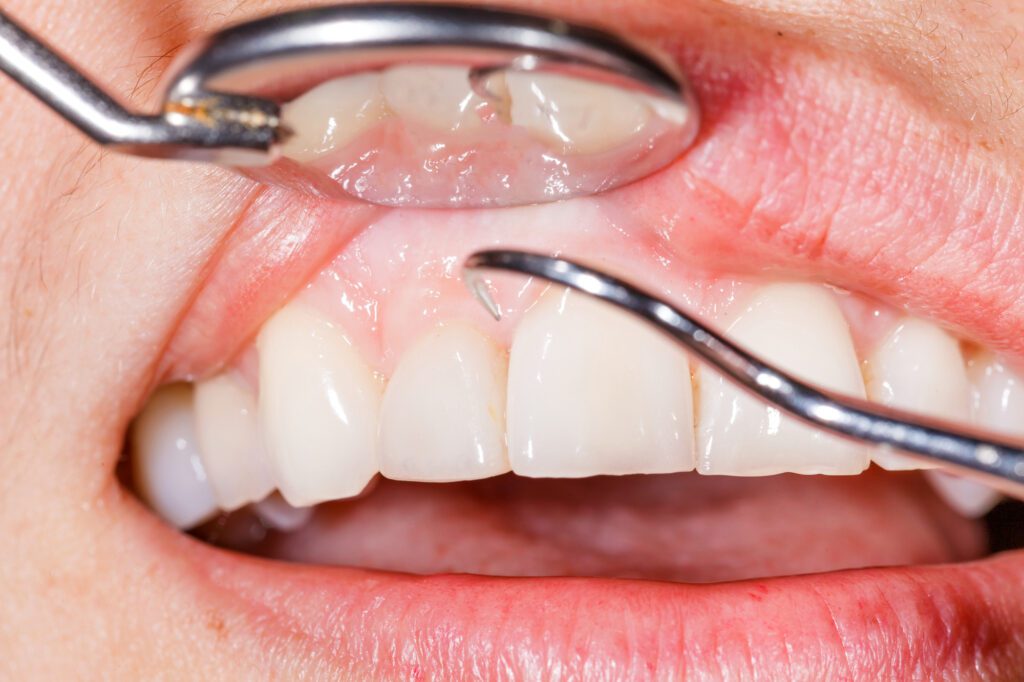Maintaining good oral health can be a challenge in itself, but it can be even more challenging if your gums bleed. Bleeding gums can occur for several reasons, which are commonly shown through things like plaque accumulation, detachment of gums to the teeth, and inflammation of the gums. These effects often come from the absence of flossing so gums bleed more when you actually do floss.
In this blog, we will talk about five reasons why gums bleed when you floss and ways to get your gums in healthy condition.

1. Accumulation of Plaque
Flossing is an effective way to remove plaque that accumulates along the gum line and in between teeth. If plaque is left untreated, it can eventually harden into tartar, which can inflame and irritate the gums. The inflamed gums in combination with the friction from the dental floss can lead to bleeding. This bleeding is often the first sign of potential gum disease.
2. Inflammation
Inflammation of the gums is the immune system’s response to plaque and tartar buildup along the gum lines. These inflammatory responses can lead to swollen, red, and tender gums. When pressure is applied to the gums through a toothbrush or floss, the inflamed gum tissue is likely to bleed and experience pain.
3. Gum Disease
Gum disease, or periodontal disease, is a more developed health condition of gum inflammation when oral hygiene practices are neglected. Gum disease is an infection that affects the structures of the teeth, including gums, ligaments, and bones. This disease develops in stages and when treated early, it can be reversed. If left untreated, inflamed gums can progress into periodontitis, which can lead to permanent gum damage. This damage may also lead to necessary dental treatments to relieve pain or even replace teeth with damaged roots.

4. Gum Attachment
Another reason why gums may bleed from when flossing is that the gums detach from the teeth over time. There should be a small and shallow v-shaped crevice along the gum lines, with the gums fitting snugly around each tooth. When gum disease is present, pockets form along the gumline due to the inflammation detaching the gums from the teeth.
As the gums weaken and the detachment of the gums increase, cleaning the teeth and mouth effectively can become difficult. Brushing alone cannot usually clean the crevices well, which is where flossing becomes important. The floss can reach the plaque and bacteria that buildup in the crevices. The gums are usually sensitive if they are more detached, so flossing may cause irritation and bleeding.
5. Poor Oral Health Habits
Having poor oral health habits can significantly contribute to bleeding gums if you floss after not flossing for a while. Simply brushing your teeth twice a day, flossing, and using mouthwash daily can help you maintain good oral health.
Brushing and flossing can help remove plaque that can lead to bleeding gums. Regular cleaning is the best way to prevent the issue from progressing and becoming painful. While a little bleeding while flossing is normal, frequent and large amounts of blood are a sure sign that you should visit a dentist to help control the situation. Dentists and hygienists provide professional cleaning to remove any plaque and tartar, along with providing instructions on how to improve your oral hygiene.

How to Care For Gums
While it can be intimidating to see blood coming from your gums, the good news is that gum issues can usually be resolved and even reversed. As mentioned before, regular brushing, flossing, and rinsing can drastically improve the status of your gums.
Improve Habits if Your Gums Bleed
Easy improvements in your oral care routine can lessen problems in the mouth. If your gums are bleeding when you brush, you might consider using a soft bristle brush, or being more gentle when you brush. You can also use an anti gingivitis toothpaste, which is designed specifically for sensitive gums.
Simply flossing everyday can also lower your risk of your gums bleeding when you floss, as your gums will become more acclimated to the floss. You should also make sure you are flossing correctly and not too abrasive.
Visit a Dentist
Visiting a dentist regularly is very important in maintaining good oral health and addressing any issues. Dental cleanings can effectively remove stubborn plaque and tartar buildup that is difficult to reach on your own. The thorough cleaning provided at a dental office can help reduce the amount of inflammation of the mouth and thus avoid bleeding of the gums.
Dentists are highly trained to diagnose and treat gum issues like gingivitis and periodontitis. For those who may have these diseases or see the early signs of them, a dentist can provide appropriate treatments to resolve major issues and manage the condition. In some more serious cases, more invasive procedures may be necessary to preserve the condition of your teeth.
Schedule an appointment with Bismarck Dental today to get started on improving your oral health.
